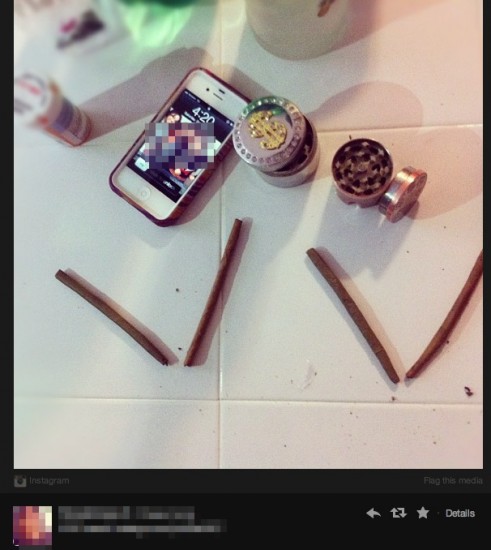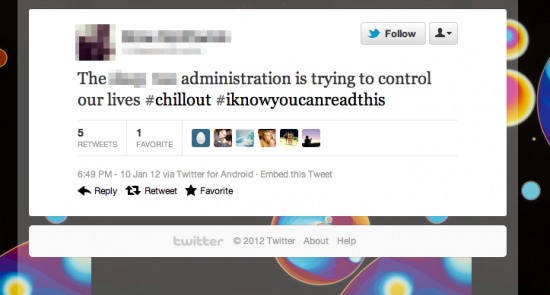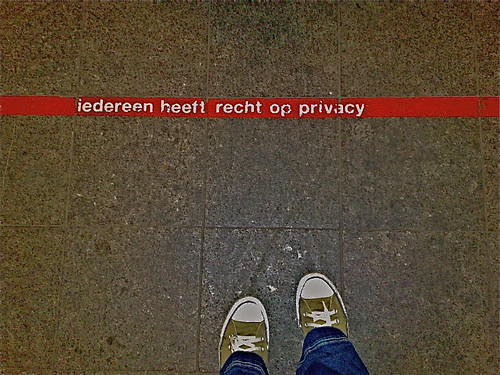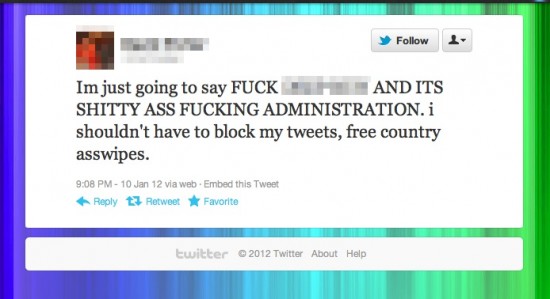Prior warning — A little ways down this page is an actual tweet that uses expletives. It felt stupid to try to blur out the words. If it bothers you don’t read it. I also blurred out information I felt would ID these people or their schools. They are ID’d as being from the general VA area but they aren’t necessarily from the Henrico school system.
I’m briefly talking to our administrators about social media on this coming Tuesday. As a result, I was messing around with some of the ways you can do location-based searches on Twitter. It’s pretty simple, go to the advanced search, add a location and set it to search within 50 miles or so. That allows me to search for “school” or whatever and see results from my area that are likely to be more relevant.1
My goal was to find a few tweets that made my point- that Twitter and other forms of social media can offer a pretty unique insight into the broader conversation occurring around and about your school. I believe that were I a principal, I’d want to be aware of this conversation. If lots of students are saying my school sucks or that it’s awesome, I’d simply like to be aware. That knowledge might impact my actions, it might not. This particular channel might also let me get ahead of things, like fights or parental complaints, before they reached crisis levels.
As I continue to wander and think things through, it gets more complicated. I, without much effort, found images like the one below.2

I don’t know what the legal obligations are for finding something like this. I’m also more than a little fuzzy about the general moral obligations. Were it me, this person seems to need some help.3 That conversation would likely be really difficult. How do you take information like this and act on it in a way that doesn’t make you appear to be big brother? Additionally, if this person is a minor and given your role as a guardian, are you obligated (morally or legally) to inform that person’s parent? There’s about a million questions I have around this and how to use what I believe is important information in a way that doesn’t result in something like what’s going on in the screenshot below.

It seems like schools by default can take this information and use it a very persecutory manner. Our AUP does say the following-
1.Students are prohibited from accessing or attempting to access instant messages, chat rooms, forums, e-mail, message boards, or hosting personal web pages during the instructional day unless authorized by a teacher or administrator for instructional purposes.
and
2. Students shall not reveal unauthorized personal information about themselves or others.
and
5. Students should understand when communicating electronically that their screen name, posted photographs and language represents them online and must meet acceptable use standards.
and finally
6. Students should use technology for school-related purposes only during the instructional day.
There’s also some stuff about bypassing filters and a few other things. Where this could get complicated is that most of our regulations are written under the auspices that students during school would be using our hardware and our network. Given that the majority of tweets I saw were posted via Blackberry and iPhone, that assumption is not so solid any longer. We do have other regulations that prohibit the use of cell phones at school so no matter what you’ve got a Code of Conduct violation that someone could pursue.
I don’t know about the choice of punishing students for posting general things to Twitter. There’s also the opposite issue of making rules and not enforcing them.4 In certain ways it’s also like war-time spies. You don’t burn a resource for trivial gains. You hold on to your resource and use it strategically for the insight it gives you to larger issues. You get into a whole different world of drama and entanglements if negative comments are being published about other students.
It seems like education keeps ending up in a position where it is attempting to govern student expression outside the school. That expression may occur during school hours or after and the impact of this conversation on the learning environment always comes up. I don’t know the answer but I do know that an environment of animosity and a feeling of persecution is not a benefit to anyone. There seems to be an expectation from students that these are their comments in a non-school space and, as such, are seen as at least semi-private. I lost at least one tweet demonstrating that pretty clearly but, as you can seen above, the use of these conversations by school administrators creates some real anger from students in a way that might seem surprising given the public nature of the accounts. In an unhelpful way, I can see both sides of that.
So all this to say that this is a messy, messy place. We have unprecedented access to our students’ personal lives should we choose to pursue that access.5 I’m not sure we know what to do with that access and in many ways life is easier not knowing. Ignorance is a kind of bliss. Knowing is often very complicated. There are a lot of gray areas that are going to become painful places for a lot of people- students, teachers, and administrators for the foreseeable future.
1 I’m not sure exactly how this is determined. I believe it to be from a combination of GPS information from phones and from the location indicated in Twitter profiles- in other words, not the kind of thing I’d bet my life on but good enough for light work.
2 For those of you who need exposition, the phone is showing 4:20 and those are not cigarettes.
3 At a minimum this person might consider options other than documenting illegal drug use online in quite so public a manner.
4 Rewriting the AUP and making some arguments on the overall Student Code of Conduct is on my list of painful things to do that will likely cause people to dislike me.
5 Twitter in this example but it certainly goes across any number of other services.



It’s messy indeed, and I’m ate loss as to provide suggestions. Ignoring this is not being realistic, bring aware puts us in conflict with what to do with the info.
What I prefer to frame is that this is the seemy underside of the net that has to be able to exist to provide the platform of openness that gives us the Good Things. I don’t see how you can have one without the other.
The front we can work on is to make examplea like this known as you have done but also keep shining light on what the positive rationales are for doing the kind of social listening you started describing– where are those tweets? We focus so much on the negative because it is hard to accept.
Alan,
I end up conflicted about whether any of the student posts I used as examples are “bad”. I think that’s what makes this so very difficult. Seeing this stuff as negative is the default reaction but I’m looking at it more as bringing things to light. These things are going on. Is it better to be aware of them and able to help or ignorant? Ignorance is easier in so many ways but I don’t think it’s the right path. In many ways I think social media simply removes illusions. The medium then gets the bad rap rather than the behavior.
I don’t have the personal experiences of people taking good/bad information found this way and doing good things with it. I believe that the using this information in a punitive way is a bad idea but I’m sure there are many that would argue with me.
This topic is very much on the minds of many school administrators. I think that the right to freedom of speech will protect students from any kind of out of school public expression, appropriate, stupid, or not. From the reading I’ve done, it appears that if a school or district tries to hand out punitive measures for online expression by students, the student can cite freedom of speech as a defense. Unless the expression resulted in psychological or physical injury to another party or created a situation that prevented the normal flow of the eductional day, the courts are likely to rule in favor of the student. I think we can only hope to reach some students by proactive education about digital footprints and the possible negative effects of creating a poor online profile.
As much as I’d like to have a better understanding of this than I do, I often feel as though when schools try to get into the role of policing students’ conduct, very little good can come of it. Modeling proper behavior, and building strong relationships, as ineffective as many may say it is, is where you’re going to have the most prfound impact.
I hope I’m discouraging policing and encouraging thinking through this in ways that might build relationships or, at least, understanding. The main point being that unparalleled access into student lives comes with a lot of really hard questions and possible legal ramifications. It’s not simple and that leads a lot of people to opt for as much ignorance as possible or to go the police route. There ought to be someplace in the middle.
I belive that all students are entitled to some privacy